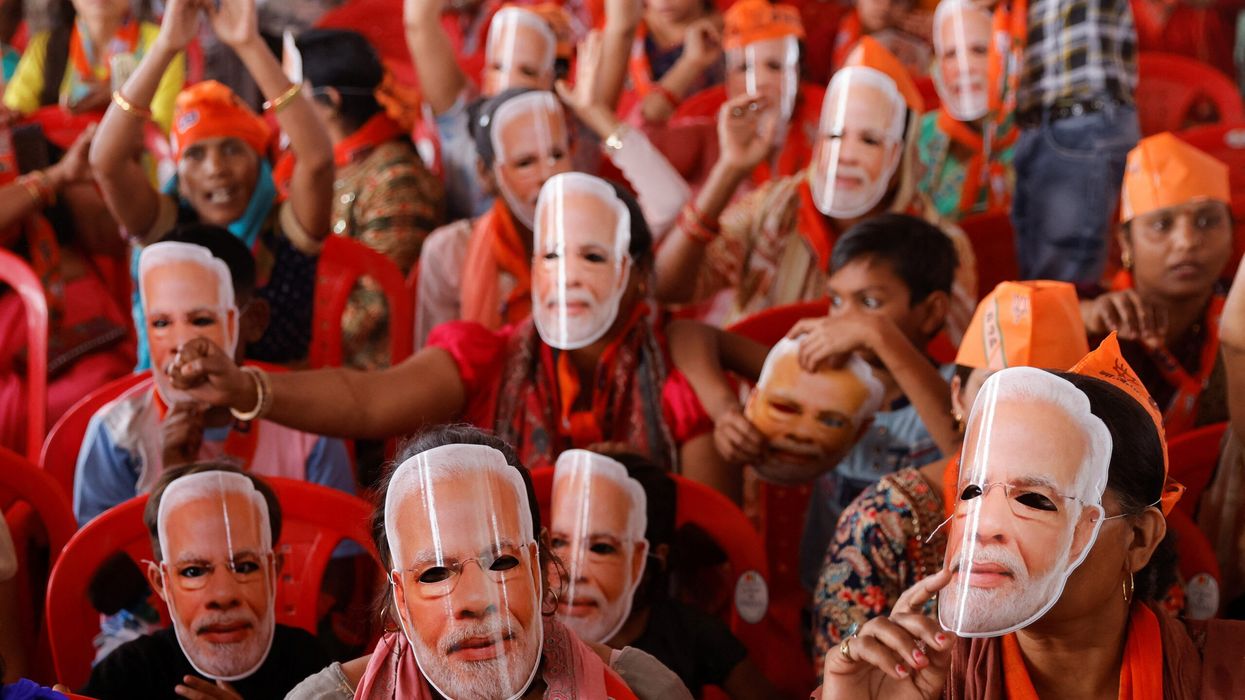More than half the voters in the Indian city of Rampur are Muslim, but its member of parliament is from the ruling Bharatiya Janata Party and a staunch supporter of Prime Minister Narendra Modi's muscular Hindu-first agenda.
It is a situation repeated across Hindu-majority India, where many consider victory for Modi's ruling Bharatiya Janata Party (BJP) in upcoming general elections a near certainty - and see Muslim candidates as a recipe for defeat at the ballot box.
While India's 220 million Muslims make up a little under a fifth of its 1.4 billion population, Muslim representatives in parliament have almost halved to less than five per cent since the 1970s.
"Everyone wants a connect with BJP," said Ghanshyam Singh Lodhi, who is confident of re-election as MP for Rampur in Uttar Pradesh state when the six-week-long elections begin on April 19.
Lodhi, a Hindu, replaced Rampur's Muslim MP in a 2022 by-election, jumping ship from the last lawmaker's party to become a BJP loyalist.
Muslim leaders worry at the lack of representation. There were just 27 Muslim MPs in the 543-seat lower house in parliament - and none of them were among the BJP's 310 lawmakers.
Ziya Us Salam, author of a book on Muslims in India, says members of the faith had for decades placed their trust in secular parties, a process that created an "acute absence of Muslim leadership".
Today, an overtly Muslim leader would be challenged as stoking sectarian divisions, yet few question when Modi champions constitutionally secular India as a "Hindu Rashtra", or Hindu state.
"Nobody talks of (Modi) being the leader of only Hindus," Salam said.
He also argues that successive gerrymandering policies since independence in 1947 have redrawn electoral boundaries to split areas with substantial Muslim populations.
'Not able to vote'
Rampur has elected Muslim MPs 15 out of 18 times since 1952.
But Kanwal Bharti, a 71-year-old activist and writer from the city, said the BJP's dominance means that it "doesn't seem possible anymore" for a Muslim candidate to win Rampur.
Rampur's last Muslim MP was veteran politician Mohammad Azam Khan - but he quit after more than 80 legal cases were brought against him, ranging from land grabbing to intimidating government officials.
His supporters said many of the accusations were years old and that charges had only been belatedly brought after the BJP won state elections in 2017.
Khan was jailed for three years in 2023 for hate speech against BJP rivals.
Past elections were marred by allegations that security forces blocked Muslims from voting.
A legal challenge that a 2022 parliamentary by-election vote was manipulated "by using every unconstitutional means" to stop voters from Muslim-dominated areas was dismissed on a technicality.
Some Muslim voters in Rampur worry about casting a ballot later this month.
"If the conditions during the last election are repeated, I will again not be able to vote," said 75-year-old Mohammad Salam Khan, reading a newspaper in his son's electrical repair shop.
'Intimidation' and 'elimination'
It is part of a wider shift, said Asaduddin Owaisi, one of two lawmakers in the last parliament from the All India Council for Unity of Muslims.
Owaisi believes even secular parties avoid selecting Muslim candidates because they fear they would not appeal to Hindu voters.
"They are afraid to even give a ticket to a Muslim candidate," Owaisi said, accusing the ruling party of stoking fear against Muslims.
"It is very difficult for the Muslim candidates from any political party to win".
The BJP denies "active discrimination" based on religion, pointing out that representation depends on candidates winning elections.
A handful of Muslim candidates the BJP fielded in the last two national elections all lost, with critics accusing the party of showing disinterest in their campaign.
"We have this aspiration, ideally, to have people from every community," BJP national spokesperson Mmhonlumo Kikon told AFP.
But Salam, the author, believes Muslims are being squeezed out of the democratic process.
"So, you don't give tickets to Muslims at one place, you redraw constituencies at another place... or you don't allow Muslims to vote," Salam said.
"It's not just intimidation," he added. "It's also elimination." (AFP)




